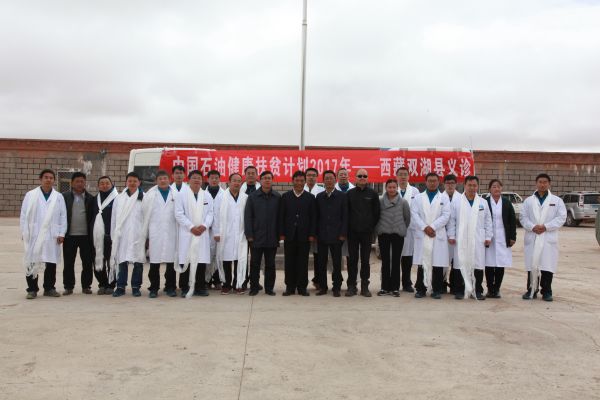
The medical team from CNPC Central Hospital take a group photo in Tsonyi County, Tibet Autonomous Region. Photo by Wang Zhifu from CNPC
After just a week in Tsonyi County, China's highest county, doctor Huo Zhiping had two babies named after him, because he performed caesareans on their mothers.
Huo, an obstetrician with a medical team from Central Hospital of China National Petroleum Corporation (CNPC), was a volunteer in Tsonyi County,Tibet Autonomous Region, this summer.
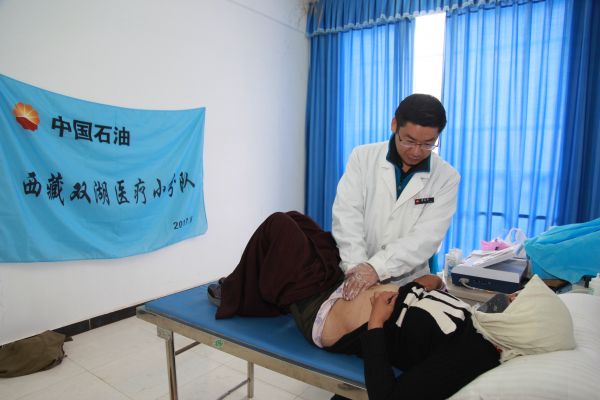
Huo Zhiping, an obstetrician with the medical team, checks on a patient. Photo by Wang Zhifu from CNPC
The newborns, Huo Dangsheng and Huo Yousheng, were the first babies delivered locally via cesarean operation in the county, where most areas are around 5,000 meters above sea level.
LIFE STORIES IN NAMES
With her baby boy in her arms, Chode remembers her fear about his birth. She was diagnosed with a deficiency of amniotic fluid and the umbilical cord was wrapped around the baby's neck.
"Chode needed a caesarean, but we had never performed one," said Changchub Drolma, head of the People's Hospital of Tsonyi County, the only hospital in the county.
Expectant mothers like Chode were usually transferred to hospitals in Lhasa, across more than 700 kilometers of mountain roads. "The trip was perilous for both mothers and babies," said Changchub Drolma.
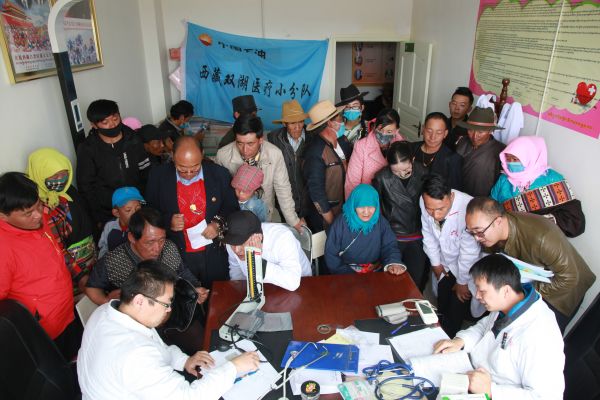
The consulting room is overcrowded with Tibetan patients. Photo by Wang Zhifu from CNPC
Chode was lucky as the medical team was in the county for a week.
"On the plateau, it's hard to know the condition of mother and baby with such little natural oxygen," said Zhang Yanzong, who led the medical team.
Huo pointed out that Chode was 36 years old, which made complications such as postpartum bleeding more likely.
The altitude also affected the doctors who had to perform the operation while taking in bottled oxygen themselves. "Lack of oxygen makes you slow in your reactions," Huo said.
After one and a half hours, a baby boy was delivered.
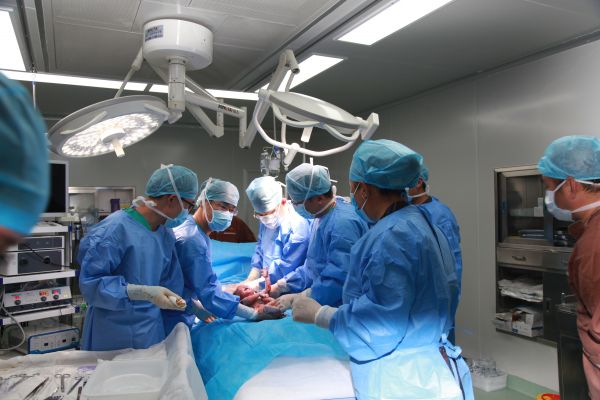
Huo Dangsheng, a baby boy, is delivered via cesarean operation. Photo by Wang Zhifu from CNPC
"Thanks to doctor Huo and others in the medical team," said new father Pasang. The couple decided to name their son after Huo, so he would remember who had saved his life.
One day later, Sangye Drolma, 28, came to the hospital from a township more than 200 km away. She showed signs of a difficult childbirth.
After a cesarean lasting around 70 minutes, her daughter was born. She also named the girl after Huo.
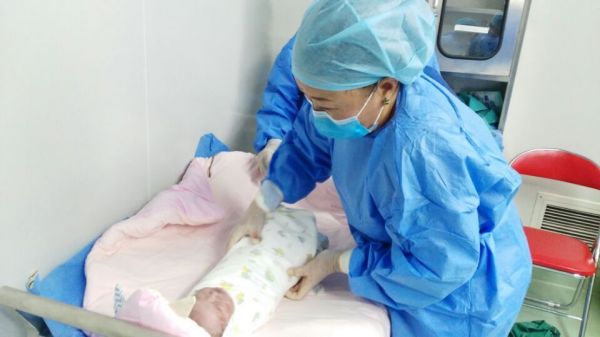
A doctor takes care of the baby girl Huo Yousheng. Photo by Wang Zhifu from CNPC
These naming stories remind Yang Wensheng, Party Secretary of Tsonyi County, of his own family.
Yang's mother had a difficult delivery when giving birth to his older sister in northwest China's Shaanxi Province over 60 years ago. The doctor on duty told his parents that only one could survive, either the mother or the baby.
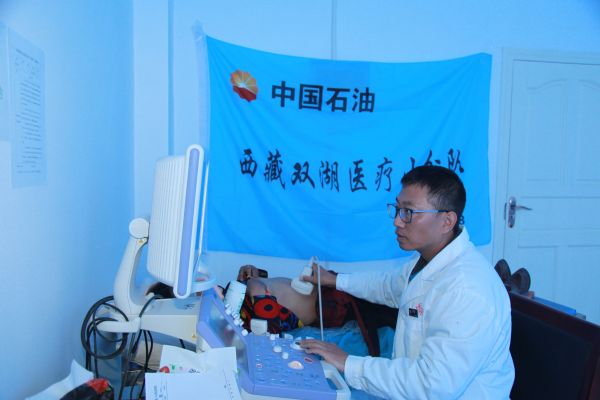
Doctor Meng Xiangan is doing medical ultrasound for Tibetan patients. Photo by Wang Zhifu from CNPC
"It was their first baby," Yang said.
But a doctor named Yang rushed to hospital from home and performed surgery that saved both mother and baby girl.
"My father felt so indebted that he decided to name my sister after the doctor. He even said no matter how many children he had, they would all be named Yang," he recalled.
The Tibetan family kept its word. All nine children have the surname Yang.
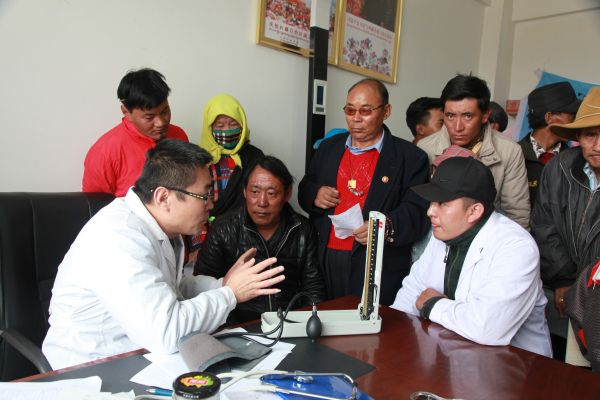
Doctor Liu Tao measures blood pressure for Tibetan patients. Photo by Wang Zhifu from CNPC
IMPROVED MEDICARE ON THE PLATEAU
Home delivery was preferred in rural Tibet, causing high maternal and infant mortality. Tibetans believed that home births were more "natural" and it was difficult for many who lived in remote areas to get to hospital.
When the plateau was liberated in 1951, its maternal and infant mortality rates stood at 50 per and 430 per 1,000 respectively. The figures had dropped to 1 and 16 per 1,000 in 2015.
Behind the change is improved medical care and more acceptance of hospital births. More than 90 percent of Tibetan women choose hospital births now. Tibet covers hospital costs for mothers from rural areas and offers a one-off payment of 1,000 yuan (around 150 U.S. dollars) each time they deliver in a hospital.

Doctor Dong Yixue checks blood sugar for a patient. Photo by Wang Zhifu from CNPC
With 22 medical staff, the People's Hospital of Tsonyi County can treat simple illnesses and perform some surgery. Patients with severe problems still have to go to Lhasa.
"The medical situation in Tsonyi has improved a lot in recent years," said Yang. Tibetans who were once unable to afford to see a doctor, now regularly visit government clinics and hospitals.

Doctor Rao Shijun checks out patient’s health report. Photo by Wang Zhifu from CNPC
Through a government "pairing-up" program since 1994, various provinces, municipalities, central government departments and state-owned enterprises have provided personnel, materials, financial and technological support to Tibet.
In 2002, CNPC, China's largest oil and gas producer and supplier, began to support the county, said Li Anming, director with the emergency office of CNPC Central Hospital. Affiliated hospitals started to send medical teams to the county in 2009. So far, nearly 100 doctors have volunteered to go there. Local Tibetan doctors and nurses also visit affiliated hospitals for training each year.
Huo's medical team received more than 950 patients and performed four operations, including the two caesareans, in just a week.
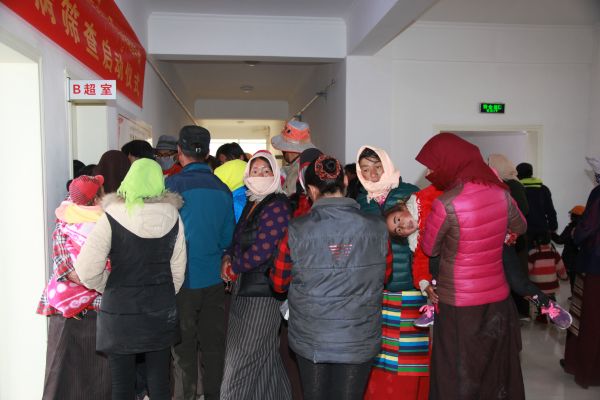
Lots of Tibetan patients are waiting to see doctor in the corridor of the People's Hospital of Tsonyi County. Photo by Wang Zhifu from CNPC
"Most of patients traveled over 200 km to see us. I was touched by their trust," said Huo.
Before leaving Tsonyi, Huo put the photos of the two Tibetan babies in his suitcase.
"I started missing this place before I even left, missing my 'daughter' and 'son,'" he said.

